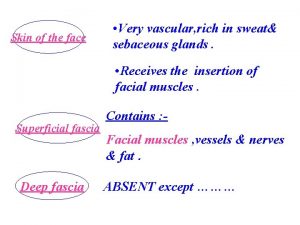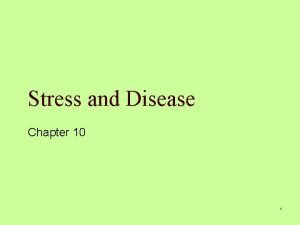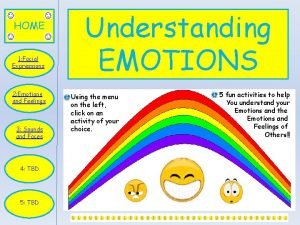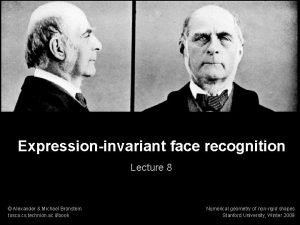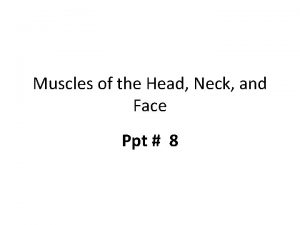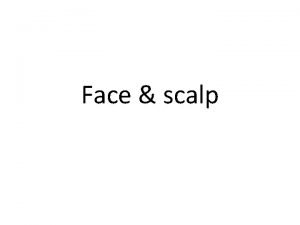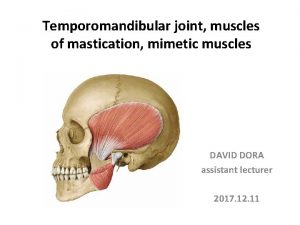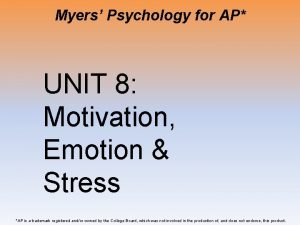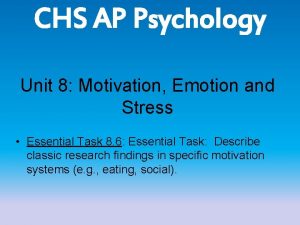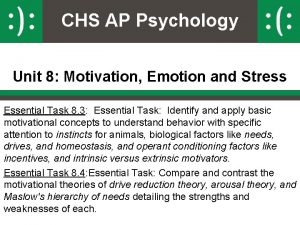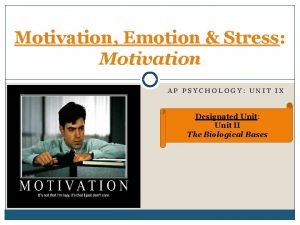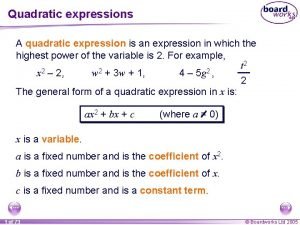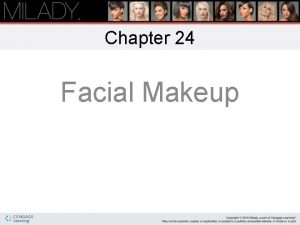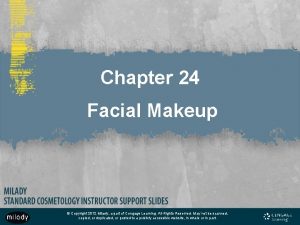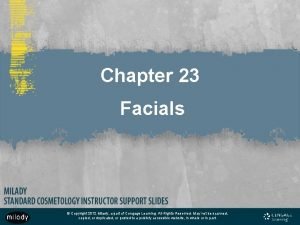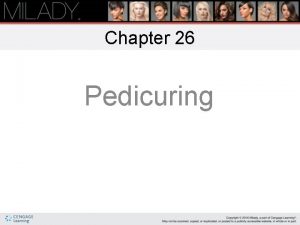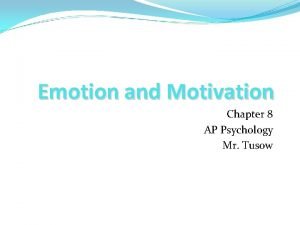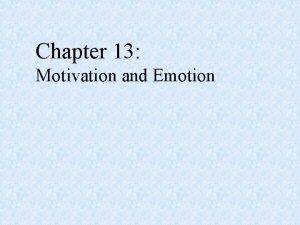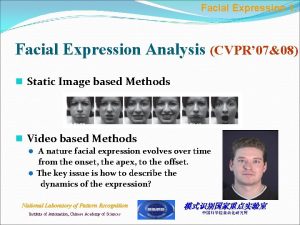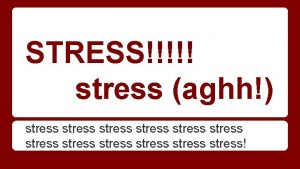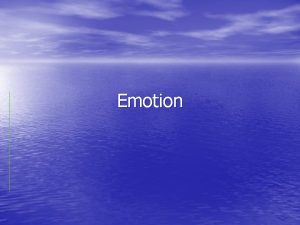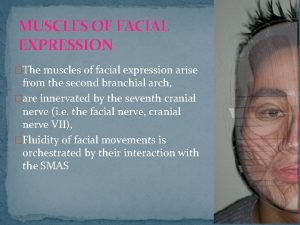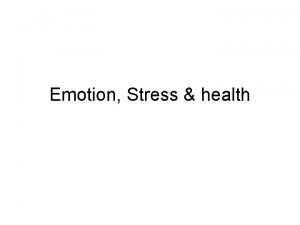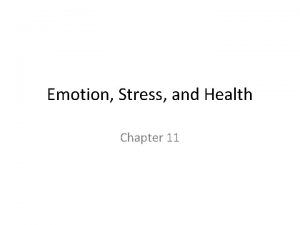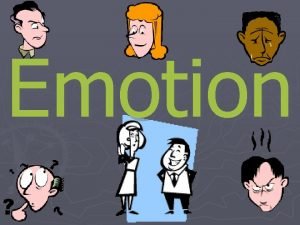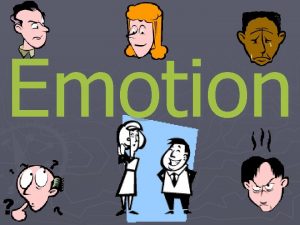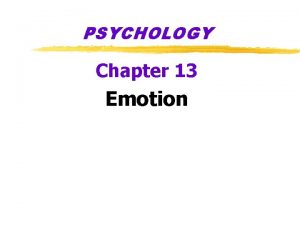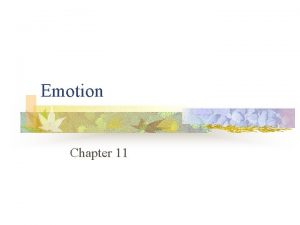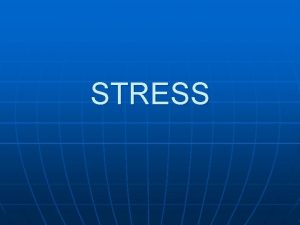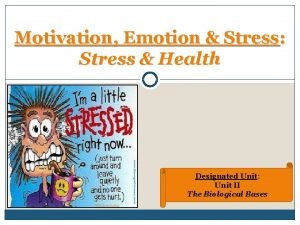Emotion Stress Health Chapter 12 Facial Expression Emotion




















- Slides: 20

Emotion, Stress, & Health Chapter 12

Facial Expression & Emotion • Communications of emotion through facial expressions – Certain facial expressions seem to be universal in meaning, regardless of culture http: //www. bbc. co. uk/science/humanbody/mind/surveys/smiles/index. shtml – Certain aspects of facial expression are learned – display rules specify types of emotions people should express in certain situations

Modern Model of Emotion • An emotion is a complex, multi-component episode that creates a readiness to act

Physiological responses, by emotion

Positive Emotions • Negative emotions narrow our focus – We are less distracted – Better attention to detail – more accurate judgment • Positive emotions broaden our thinking & actions – – They expand our ways of thinking Attention is more spread out We are more creative, curious Broaden-and-build theory –positive emotions encourage resource acquisition, helps long-term health & well-being

Subjective well-being • Product of – Genes: Twin studies suggest wellbeing is about 50% attributable to genetic inheritance – Life events have a major impact • presence of positive events (esp in well-to-do societies) • absence of negative events (esp those struggling to survive)

Emotion Regulation • Emotion regulation – Refers to people’s responses to their own emotions – Sometimes people have goal of intensifying emotion while other times people want to minimise emotion – ability to do so predicts social success

Emotion Regulation • People develop different strategies to control or regulate their emotions

Stress • The pattern of responses an organism makes to stimulus events that disturb its equilibrium and tax or exceed its ability to cope • “If you repeatedly turn on the stress-response, or if you cannot appropriately turn off the stress response at the end of a stressful event, the stress-response can eventually become nearly as damaging as some stressors themselves. ” -Robert Sapolsky

Factors affecting the stressfulness of a negative event 1. Controllability – Degree to which we can stop event or bring it about – More uncontrollable event seems – more likely to perceive it as stressful 2. Predictability – Degree to which we know if & when event will occur – Ability to predict occurrence of event reduces severity of stress

Factors affecting the stressfulness of a negative event 3. Major changes in life circumstances › Any life change that requires numerous readjustments can be perceived as stressful › Negative events much greater impact on physical & psychological health than positive events 4. Internal conflicts › Unresolved issues that may be either conscious or unconscious › Conflict occurs when person must choose between incompatible or mutually exclusive goals

Physiological Reactions to Stress • How stress affects health – Continued presence of stressor – more vulnerable to illness • Chronic stress lead to physical disorders, e. g. Ulcers, CHD – Coronary heart disease (CHD) • Chronic over arousal from stressors can cause CHD • Stress can explain about 1/3 of the risk for heart disease, and is implicated in more than half of all known illnesses • “Recently we have begun to think that all illness, including heart diseases, bacterial and viral infections, and even cancer, might be influenced by stress. ” -Richard S. Lazarus

Psychoneuroimmunology How stress & other psychological factors affect the immune system

Physiological Reactions to Stress • . . . How stress affects health – Direct route: The immune system • One important factor: how much we can control stress • Lower controllability = greater impact on immune system – Indirect route: Health-related behaviors • Most death from disease in industrialized countries is heavily influenced by health-related behaviors (e. g. smoking, drinking alcohol etc. ) • Stress indirectly affect health by reducing rates of positive healthrelated behaviors & increasing rates of negative behaviors

2 Types of Coping Skills Problem-focused coping › Firstly define the problem, then generate possible solutions & consider their costs & benefits › With this type of coping, it is less likely to experience depression either during or after stressful event Emotion-focused coping › People use emotion-focused coping to avoid their negative emotions from overwhelming them & preventing them from taking action to solve problems

Some Coping Strategies Behavioral: physical exercise, venting anger Cognitive: temporarily setting problem aside Social: Seeking emotional support from others to adjust emotionally & physically to stressor Maladaptive: avoidance, rumination (longer & more severe stress)

Coping Skills Emotion-focused coping: Talking about emotions & issues in life appears to have positive effects on health

Managing Stress Behavioral techniques › To help people control their physiological responses to stressful situations, can use behavioral techniques › Biofeedback In biofeedback training – people receive information about an aspect of their physiological state & then try to alter that state › Relaxation training Involves teaching people techniques to deeply relax their muscles and slow down and focus their thoughts Where biofeedback & relaxation training been used – most important variable is learning how to relax

Managing Stress Exercise › Individuals who regularly engage in aerobic exercise show significantly lower heart rates & blood pressure in response to stressful situations than others › Physically fit people less likely to become ill following stressful events Cognitive techniques › Cognitive behavior therapy Attempts to help people identify kinds of stressful situations that produce physiological or emotional symptoms & alter the way they cope with these situations Some even better ones on p. 353

Reading assignment • Required: 333 -340 – Recommended: 341 -353
 Facial vein and cavernous sinus
Facial vein and cavernous sinus Chapter 10 stress responses and stress management
Chapter 10 stress responses and stress management In figure 1 what facial expression did mommy lenny show
In figure 1 what facial expression did mommy lenny show Facial expression recognition
Facial expression recognition Muscles of facial expression ppt
Muscles of facial expression ppt Examples of facial expressions
Examples of facial expressions Muscles of face and scalp
Muscles of face and scalp Chin muscle
Chin muscle Myers psychology unit 8
Myers psychology unit 8 Unit 8 motivation emotion and stress
Unit 8 motivation emotion and stress Ap psychology unit 8
Ap psychology unit 8 Alfred kinsey ap psychology
Alfred kinsey ap psychology A quadratic expression is an expression of
A quadratic expression is an expression of True strain equation
True strain equation Definition of axial stress
Definition of axial stress Milady makeup chapter
Milady makeup chapter Oil-based makeup remover best removes what makeup? milady
Oil-based makeup remover best removes what makeup? milady Basic facial steps milady
Basic facial steps milady Chapter 26 pedicuring review questions
Chapter 26 pedicuring review questions Overjustification effect
Overjustification effect Chapter 13 motivation and emotion
Chapter 13 motivation and emotion
